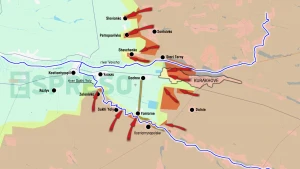
One year since liberation of Bucha: progress in war crimes investigation is slow
The Russian troops in the Kyiv region are accused of committing nearly 11,000 war crimes, according to the Prosecutor General's Office of Ukraine. 700 of them were recorded in Bucha alone.
DW spoke with the family members of civilians who lost their lives in Bucha.
Valentyna Zen, a 69-year-old pensioner, was fatally shot in the yard of her home in Bucha, a suburb of Kyiv, on March 25, 2022, by Russian occupying forces. Her body remained in the yard until March 31, when the Ukrainian army liberated the town.
During the initial weeks of Russia's invasion of Ukraine, Zen's daughter Tetyana had stayed with her, but she and her son were evacuated to Kyiv on the day before the shooting. Zen had chosen to stay behind and did not want to accompany them.
According to what some neighbors who witnessed the events told Tetyana, her mother Valentyna Zen went to Sklozavodska Street to fetch water. That was where some Russian troops were stationed. Later that day, these allegedly entered the yard and just started shooting.
According to Tetyana, the soldiers would kill at least two people every day in their own yards. "When my mother saw the Russians and heard gunfire, she was on the phone. She fled in terror and entered the home, but a bullet pierced her liver as it struck her through the door. Mom died from bleeding to death.”
Despite a year passing since the murder, investigators have not questioned Tetyana about the incident, and the family is unsure if there will be a court case. Zen's grandson found her body after the Ukrainian army liberated Bucha and buried her himself in the town. The authorities questioned him about this once in April 2022.
Shot in the woods
Serhiy’s father, Oleksandr Yaremych was killed by Russian soldiers on March 25, 2022. Oleksandr had distributed food to Bucha residents, near Russian checkpoints, and was shot dead when his house was searched. Two weeks earlier, eight of Oleksandr's friends were killed on Yablunska Street.
According to Serhiy, the soldiers found a cellphone on Oleksandr during the search, which led to them taking him into the woods and shooting him. Serhiy had spoken to his father on the same cellphone shortly before the incident.
After the murder, an official investigation was launched. However, Serhiy had spent a year inquiring about the progress of the case. He stated that the investigation was slow, and it took time to exhume the body and collect evidence. Additionally, the original investigator was replaced, and Serhiy was only recently interrogated.
Serhiy said that progress was being made, but the investigation was a tedious process, and he did not expect it to be completed until the end of the year.
Evidence of war crimes
Russian forces in the Kyiv region have been accused of committing nearly 11,000 war crimes, according to Ukraine's prosecutor general. Among these, 700 were recorded in Bucha alone. Over 7,000 criminal cases have been opened, with 118 suspects and 50 individuals tried in absentia. Four have been found guilty.
In an effort to gather evidence to support the ongoing cases, last year, the Security Service of Ukraine (SBU) and local police conducted searches in the area and exhumed bodies. Volunteers also assisted the authorities in collecting a large amount of war crimes-related evidence.
The investigations are challenging, as it is difficult to identify the perpetrators, and arresting them is practically impossible. "The main aim of this phase of the investigation is to assemble a complete evidentiary foundation as well as eyewitness accounts," said Oleh Tkalenko, the deputy head of the Kyiv prosecutor's office.
"Interrogators are often able to ascertain the identity of one or the other war criminal by questioning Russian prisoners of war," the deputy head added. These prisoners of war often provide the names of comrades who have boasted about killing, torturing, or abusing civilians.
The prosecutors are determined to bring many suspects before the judges and secure verdicts by the end of the year, despite the challenges of collecting evidence. The evidence collected so far is incomplete, but the prosecutors are hopeful that these suspects will be added to the international wanted lists. Ukraine has signed international treaties for the extradition of such criminals, and the prosecutors hope that some of them will be arrested abroad and returned to Ukraine to face trial for the crimes they committed during the ongoing war. The rest of the suspects will be apprehended after the war is won.
In addition to the investigations taking place in Ukraine, more than 20 countries have initiated investigations into Russian war crimes, according to their own national legislation. Recently, the International Criminal Court (ICC) in The Hague, Netherlands, issued arrest warrants for Russian President Vladimir Putin and Russian Commissioner for Children's Rights Maria Lvova-Belova on suspicion of kidnapping Ukrainian children.
- News













































